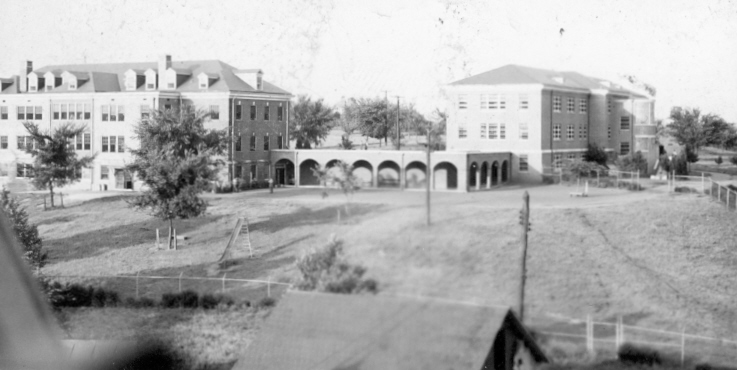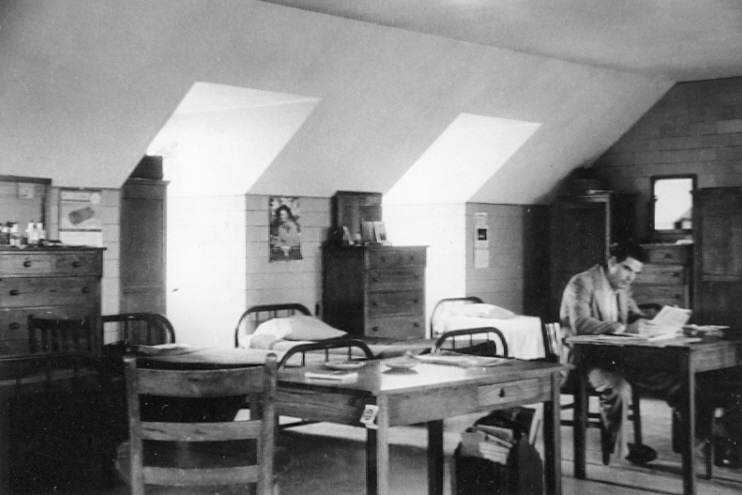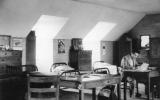CPS Unit Number 105-01
Camp: 105
Unit ID: 1
Operating agency: BSC
Opened: 5 1943
Closed: 4 1946
Workers
Total number of workers who worked in this camp: 47
-
 CPS Camp No. 105Lynchburg, VirginiaDigital Image © 2011 Brethren Historical Library and Archives. All Rights Reserved.
CPS Camp No. 105Lynchburg, VirginiaDigital Image © 2011 Brethren Historical Library and Archives. All Rights Reserved. -
 CPS Camp No. 105Lynchburg, VirginiaDigital Image © 2011 Brethren Historical Library and Archives. All Rights Reserved.
CPS Camp No. 105Lynchburg, VirginiaDigital Image © 2011 Brethren Historical Library and Archives. All Rights Reserved.
CPS Unit No. 105, a Training School unit at Lynchburg State Colony Training School in Colony, Virginia operated by the Brethren Service Committee, opened in May 1943 and closed in April 1946. The majority of the men served as ward attendants.
Directors: D.K. Christenberry, Loren Simpson
As men moved from base camps into mental hospitals and training schools, many women followed (wives, and later women’s service units). As of June 30, 1943, nine of nineteen CPS men at the Lynchburg school were married.
Men in both Mennonite and Brethren camps reported to CPS from more rural areas than did men from Friends camps.
Men in Brethren camps and units tended to report diverse religious affiliation when they entered CPS, although about half of the men reported affiliation with Brethren groups.
Men in Brethren projects reported considerably more education and professional experience than those who enlisted in the Army and Navy, and entered CPS with an average of 12.22 years of education. (Sibley and Jacob p. 171)
Thirty-four percent of men in Brethren camps and units reported technical and professional occupations or business management, sales and public administration when entering CPS. Twelve percent entered as students. (Sibley and Jacob p. 172)
The chief difference between mental health units and training schools lay in the type of patient admitted. Training schools were devoted to care of those whose mental conditions derived from hereditary factors, or for whom there was little or no hope for cure. The work in training schools was very similar to that in mental hospitals.
The majority of the men served as ward attendants, although some also served in clerical, agricultural, maintenance and construction, motor vehicle operation, technical and professional as well as food preparation roles. Of the 19,776 person hours accomplished during the life of the unit at Lynchburg State Colony training school, ward attendants provided 9,070 hours while those serving in food preparation gave 3,980 hours, those in maintenance and construction contributed 2,529 hours, and those in clerical roles performed 2,113 hours of service. (Selective Service form DSS 52 as published in Eisan p. 212)
In the mental hospitals and training schools, the superintendent held authority over not only the work of the unit, but also maintenance and discipline of all staff, including CPS men. For legal reasons, superintendents generally felt a closer responsibility to Selective Service than to either the National Service Board or the Brethren Service Committee. Men in assistant director roles represented the interests of the CPS men as well as the interests of the Brethren Service Committee to the institution and to Selective Service, as well as other concerned agencies.
The assistant director also assumed leadership for developing activities for off-duty hours. The men fulfilling the assistant director roles at Lynchburg State Colony Training School were draftees selected by the Brethren Service Committee. Most units also elected an education secretary from unit membership who assisted in camp life.
Because of heavy work schedules in the mental hospitals and training schools, the units did not have the full range of camp program found in base camps. Recreational activities provided the exception. The mental hospital units close to colleges or universities made it possible for assignees to enroll for course credit.
In March 1944, the unit invited Perry Siato of the Fellowship of Reconciliation to speak. He met with twelve members of the unit in a building housing the COs. One of the hospital board members heard about the meeting and visited the hospital to investigate, requesting a written report on the incident. A newspaper picked up the story on March 22, 1944, referring to the speaker as an “American-born Japanese and racial secretary of the fellowship of reconciliation”. The acting superintendent, Dr. A. D. Hutton, was quoted as saying a meeting like this “would never occur again” and that he had no idea such a meeting had taken place. Hutton went on to say that the assistant director, D. K. Christenberry, had expressed regret that he had not consulted with Hutton prior to the meeting. (Taylor p. 189)
The men published a camp paper, Informant.
For information on Brethren mental health and training school units see Leslie Eisan, Pathways of Peace: A History of the Civilian Public Service Program Administered by the Brethren Service Committee. Elgin, IL: Brethren Publishing House, 1948, Chapter 6 pp. 205-238.
For more information on women COs see Rachel Waltner Goossen, Women Against the Good War: Conscientious Objection and Gender on the American Home Front, 1941-47 by Chapel Hill, NC: The University of North Carolina Press, 1997.
Swarthmore College Peace Collection, Camp periodicals database.
For a more in depth treatment on mental health and training school units, see Steven J. Taylor, Acts of Conscience: World War II, Mental Institutions, and Religious Objectors. Syracuse, NY: Syracuse University Press, 2009.

